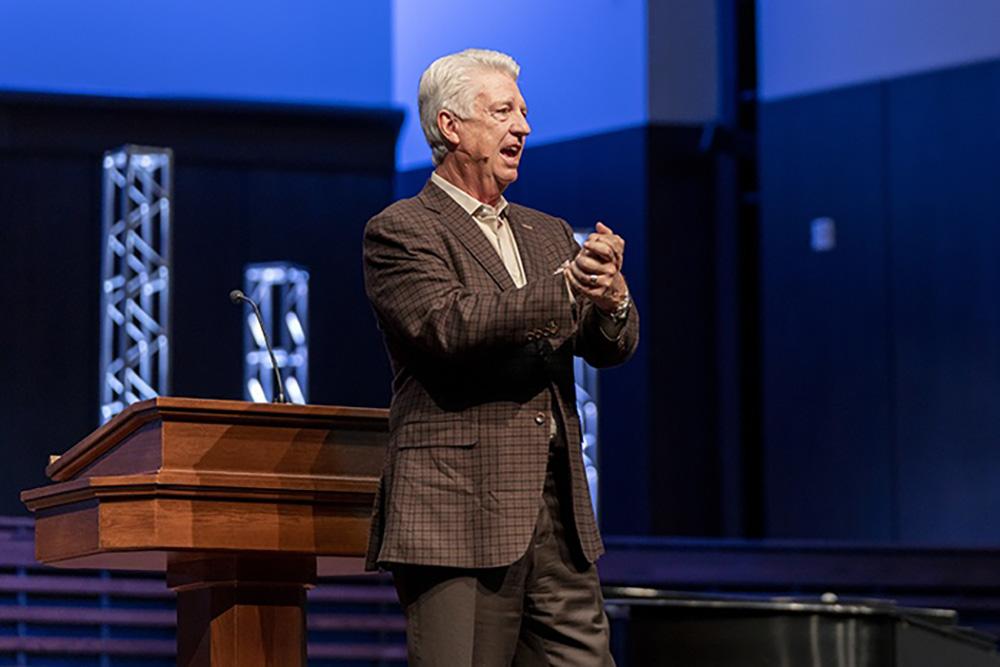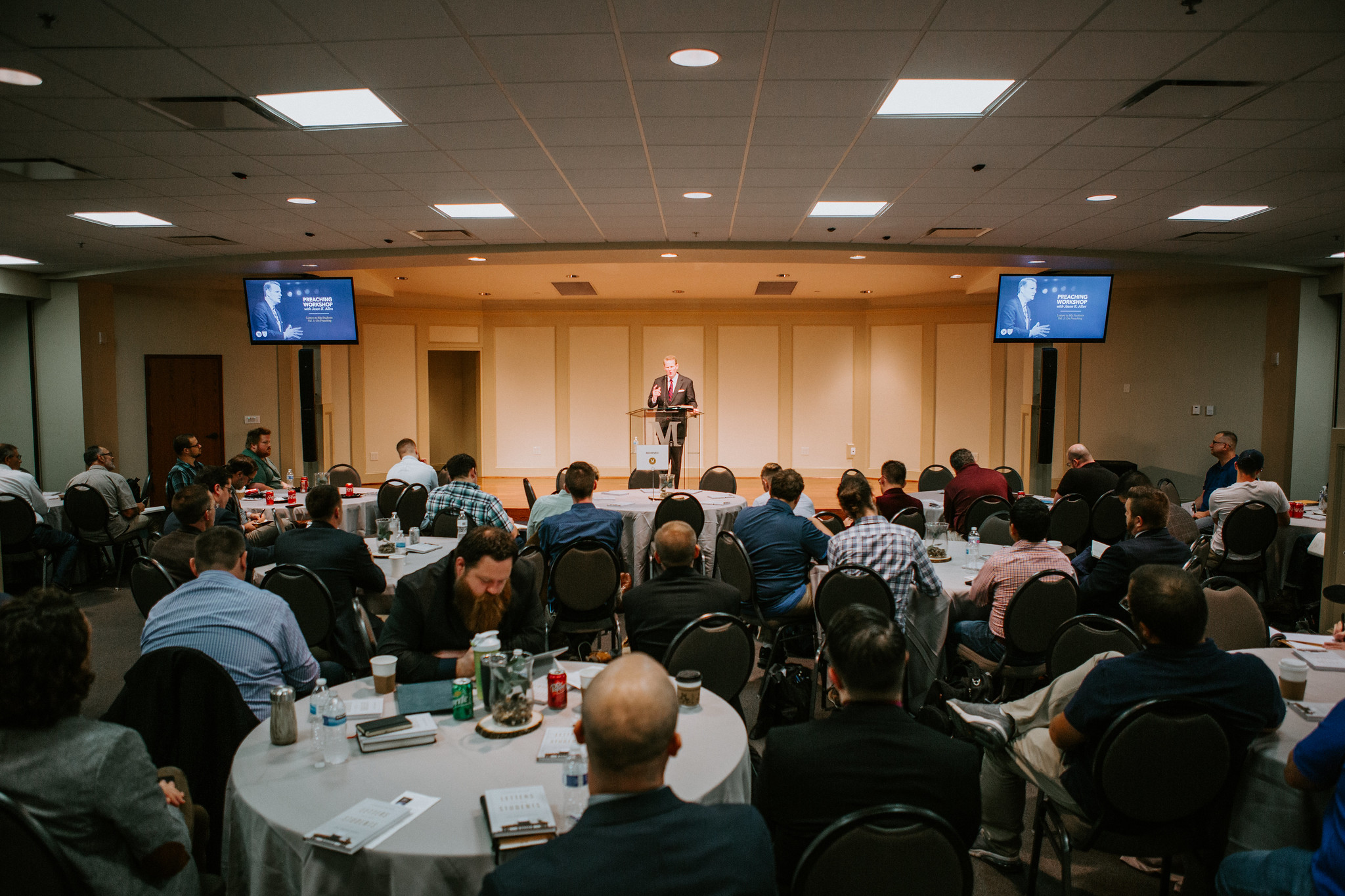
For the Church Workshop at Midwestern Baptist Theological Seminary focuses on preaching; Prestonwood Baptist Church’s pastor Jack Graham encourages chapel attendees at Southwestern Seminary chapel service to be filled with the Spirit.
For the Church workshop, led by Allen, focuses on preaching
By T. Patrick Hudson
KANSAS CITY (BP) — Midwestern Baptist Theological Seminary hosted its third For the Church Workshop on Sept. 18, featuring MBTS President Jason Allen as lecturer and focusing on the topic of preaching.
The purpose of the three-part discussion, Allen noted, was to maintain the institution’s focus on serving local churches and the seminary community by intentionally providing encouraging and applicable sessions covering relevant subjects. The seminary’s For The Church National Conference will be held this week Sept. 23-24.
Allen’s first workshop session was a chapel sermon entitled, “Four Marks of Faithful Preaching,” derived from 2 Timothy 4: 1-5, and a passage which Allen said deeply affected him early in his ministry as he explored the question, “What does it mean to preach?”
He noted that the passage, over the ages, has been a charge to most every preacher of the Gospel.
“We receive it. We identify with it. We find ourselves being simultaneously charged by it and encouraged by it,” Allen said. “It’s our charge as well to preach the word. It’s a reminder that regardless of what is or isn’t happening favorably or unfavorably in the culture, regardless of what the church is doing or not doing or what church members are appreciating or not appreciating, this charge stands clear. It stands firm. Preach the Word.”
Preaching biblically is the first, indispensable mark of faithful preaching, Allen noted. The pastor is to preach the word of God, to herald, to lift one’s voice, to proclaim, to speak boldly, even loudly.
The reason for preaching the word, Allen said is because the Scriptures search us, and the Scriptures search our people, unlike any other message we have to preach. Therefore, we must proclaim them.
The second mark of faithful preaching, Allen said, is to preach authoritatively, which means to be equipped and ready to act.
“This means whether it’s popular or not, whether your hearers want to hear it or not, and frankly, whether you as preacher feel like preaching it or not, be ready in season and out of season to do three things: reprove, rebuke, exhort,” Allen said.
The third and fourth marks of faithful preaching, Allen said, include preaching pastorally and preaching persistently.
To the point of pastoral preaching, Allen noted that a pastor should be aware of what’s at stake. Congregants depart from doctrine easily, and often the end result is devastation.
“The reality is you have about 40 minutes — maybe a little less, maybe a little more — on any given Sunday,” Allen said, to present the solution to “a week’s worth of nonsense, cultural confusion, bad televangelists, and everything else that has gone in their ears and before their eyes and into their hearts that week out of them.
“It’s urgent,” Allen said. “These are real people who we know, whom we serve, and so we want to speak with patience and instruction, but we do that out of a heart of protection — wanting to guard the flock, to guard the sheep.”
To view Allen’s entire message, visit mbts.edu/2019/09/chapel-with-dr-jason-allen/.
The workshop’s second and third sessions were lectures based off of Allen’s recently-released book, “Letters to My Students: Volume 1.” The 175-page work — which was inspired by Allen’s interest in and interactions with the book “Lectures to My Students” by renowned British pastor C.H. Spurgeon — is the first of a three-volume series that aims to be a biblical, accessible guide for ministers and ministers-in-training.
Within the book, Allen explains in three broader categories of how one prepares for the calling to preach, how the preacher then prepares his sermons and, lastly, how the preacher progresses and grows in the art of preaching.
Based on these concepts, Allen focused his afternoon sessions on “five aspects of a theology of preaching” and “five steps of sermon preparation.”
In the second session, Allen noted that who preaches, why one preaches, what is preached, and how one preaches the word are predetermined phenomena. As such, it is God who calls the preacher to preach — not a seminary, agency or denomination. God chose preaching as the method by which His message is expressed, and God predetermined His Word, the text, as what will be preached.
Allen also explained that he feels expository preaching is the best answer to “how” one rightly preaches the Word.
Quoting Martyn Lloyd-Jones — who said preaching is the highest, greatest, and most glorious of all callings — Allen said if we believe that, then it demands that we think very intentionally about who we are as a preacher, about what preaching is, and it necessitates us to think carefully about a theology of preaching.
As such, Allen covered topics including the depravity of man, the power of Scripture, the necessity of the work of the Holy Spirit, the mandate of expository preaching, and the spiritual life of the preacher.
Regarding the last point, Allen said, “I am convinced that the spiritual life of the preacher is germane to the overall success and authority of the sermon. The preacher must cultivate a holy life … God wants His vessel to be clean all the way to the inner most being, all the way to the preacher’s heart. A man’s personal life and discipline can make or break his preaching ministry.”
The workshop’s final session explored a more practical side of ministry, as Allen walked the audience through five steps for preparing a sermon. Those steps included familiarization with the text, interpretation of the passage, assimilation into a manuscript, amplifying the message, and the proclamation of the message.
To view the afternoon sessions, visit: mbts.edu/category/ftc-workshop/.
The next FTC Workshop will take place on Oct. 2 and will feature Owen Strachan, associate professor of Christian theology at Midwestern Seminary. He will lecture will be based off his new book, “Reenchanting Humanity: A Theology of Mankind.”
Jack Graham encourages seminary family to be filled with the Spirit
By Alex Sibley
FORT WORTH, Texas (BP) — Jack Graham, pastor of Prestonwood Baptist Church in Plano, Texas, reminded students and faculty at Southwestern Baptist Theological Seminary of this foundational truth for ministry during his chapel address, Sept. 19: “‘Not by strength or by might, but by my Spirit,’ says the Lord of Armies” (Zechariah 4:6).
 Preaching from Zechariah 4:6-10, in which the Lord encourages Zerubbabel to finish the work of rebuilding the temple, Graham encouraged the seminary family to rely on the Lord for every task, both large and small.
Preaching from Zechariah 4:6-10, in which the Lord encourages Zerubbabel to finish the work of rebuilding the temple, Graham encouraged the seminary family to rely on the Lord for every task, both large and small.
Graham, a two-time graduate and distinguished alumnus of Southwestern Seminary, as well as a former president of the Southern Baptist Convention, was joined in the service in MacGorman Chapel by Prestonwood’s worship team, led by Michael Neale.
Both Graham’s sermon and the worship songs emphasized the need to be filled with the Spirit.
“It’s not the might of armies or the power of personality; it is not the ability of man but the power of God that moves among us that changes everything,” Graham said.
Noting that Zerubbabel had worked many years to rebuild the temple but had little to show for it at the time of Zechariah’s prophecy, Graham shared the Lord’s encouragement to Zerubbabel that He would finish what He started, and He would do so by His own might.
“So often, we work our fingers to the bone,” Graham said, “and all we have is a big hole in the ground to show for it, and we wonder, ‘Why? Why, God?’
“God wants to fill us with His Spirit and use us for His glory,” he said. “And it is in the filling of the Spirit and the fresh fire of the Holy Spirit that we are enabled to do the work that God has called us to do.”
Graham related his early experience as pastor of Prestonwood, explaining that, in those days, the congregation was dealing with significant hurt stemming from the departure of their previous pastor. But over time, the church started growing again.
“I think one of the reasons that God was able to renew and restore Prestonwood in those days is because we were so desperate for God to move,” Graham said. “It was out of our brokenness that we discovered the power of God. And we knew that if God did it, it would get done.”
Calling attention to verse 10 — wherein Zerubbabel is encouraged not to despise the “day of small things” when it seems like little work is getting done — Graham explained that God uses such days to sanctify His servants.
“In the day of small things, learn everything you can,” Graham said. “Take it all in. Experience it. Soak it in. And what God gives you to do, whether it is large or it is small, do it to His glory.”
“People ask, ‘Did you expect to be a pastor of a church like Prestonwood?'” he said. “Not on your life; not one second.”
“What I did expect to do was to preach Christ to win as many people to Christ as possible personally, and train and develop a church that would be witnessing to the world, to our neighbors, to the nations,” he said. “What I did expect was that God’s Holy Spirit would use me to whatever extent He desired.”
Graham concluded by recalling an experience he had in chapel while a student at Southwestern Seminary. The day’s preacher asked the chapel audience, “Are you, right now, filled with the Holy Spirit?” Graham exhorted his listeners to consider the same question.
“God can’t use us until we’re usable,” he said, “and we’re usable when we are full of the might and the power and the grace and the glory of God. … The same grace that saves us is the same grace that calls us and keeps us doing what God has called us to do.”
–30–
















